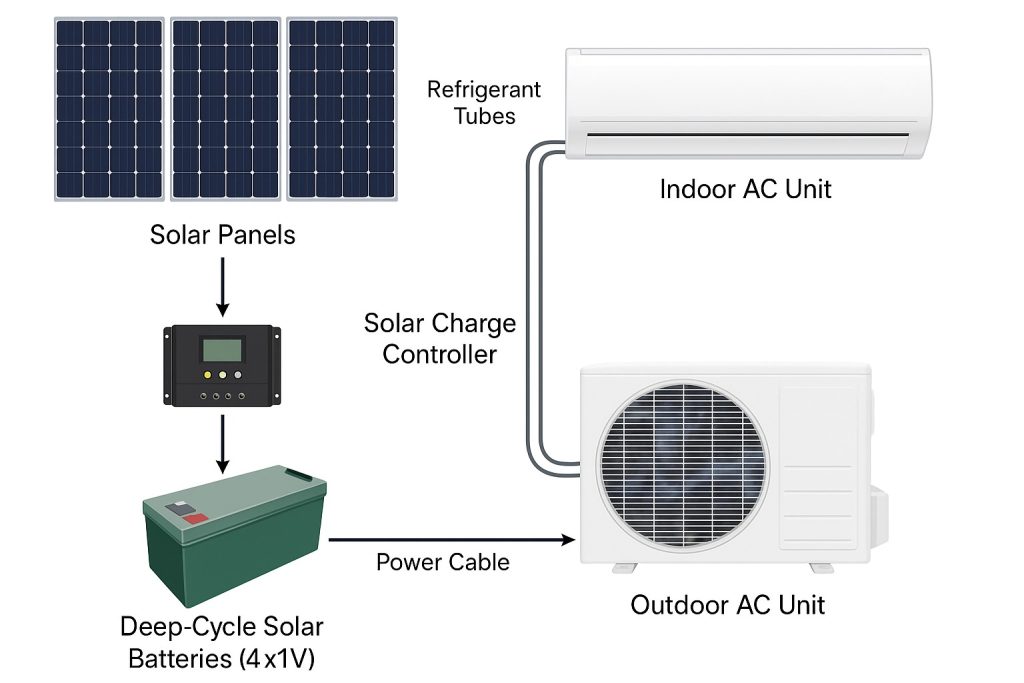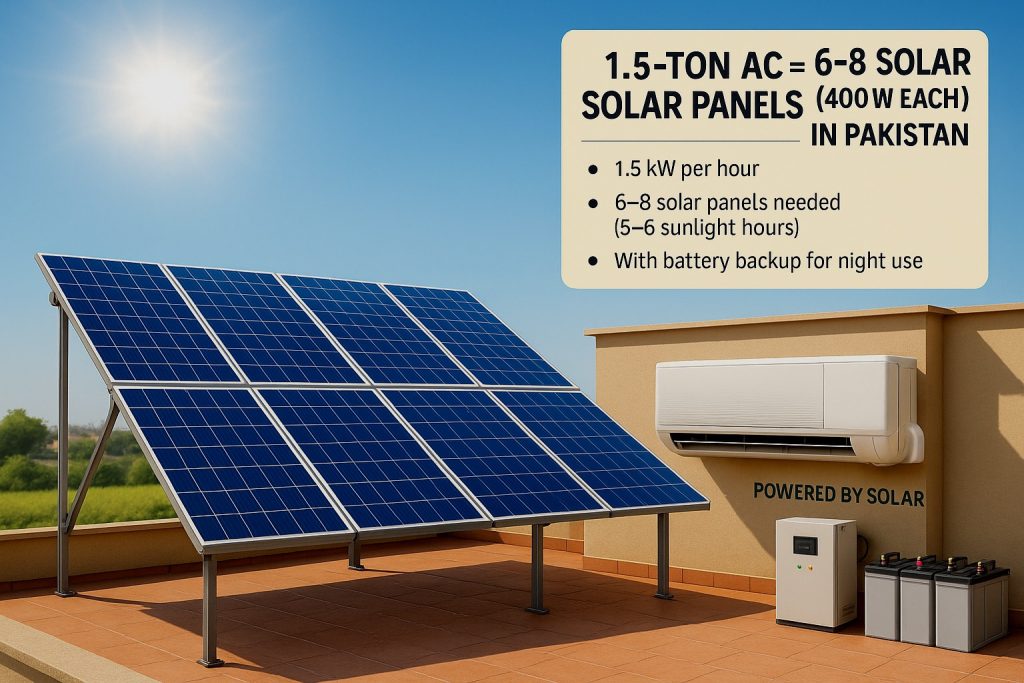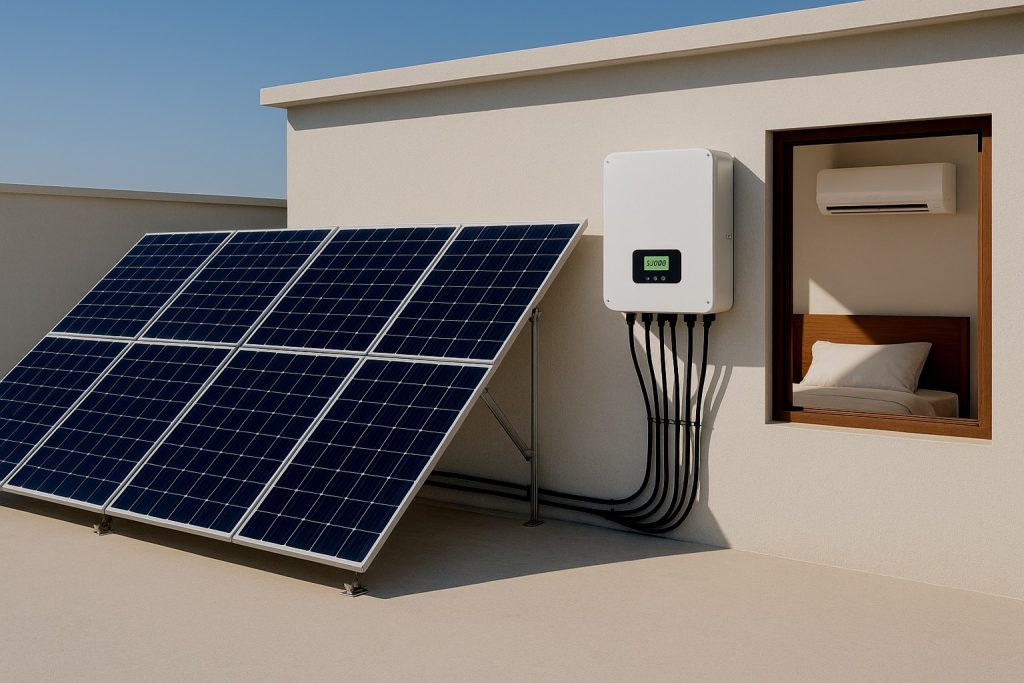Discover how many solar panels are required for 1.5 ton AC in Pakistan efficiently. Learn about daily consumption, panel sizing, inverter, and battery setup for hassle-free cooling while saving on electricity bills.
As the world shifts towards renewable energy, solar power has become a popular choice for powering homes and businesses. One common question that arises is: how many solar panels are required for 1.5 ton AC? In this article, we’ll explore the answer to this question, with a focus on Pakistan.
How many solar panels required for 1.5 ton AC
In Pakistan, the sunlight hours vary depending on the location. Let’s assume an average of 6 sunlight hours per day. To calculate the total number of solar panels required, we need to consider the total energy consumption of the AC unit per day.

Calculation
- Determine total energy consumption of AC unit per day: 1500 W x 6 hours = 9 kWh (9000 Wh)
- Determine capacity of a single solar panel: 300 W
- Calculate total number of solar panels required: 9000 Wh / (300 W x 6 hours) = 5 solar panels
Additional Considerations
Battery backup If you want to run the AC unit during nighttime or during power outages, you’ll need to add a battery backup system.
Inverter capacity you’ll need an inverter with a capacity that matches the total power consumption of the AC unit.
System losses you’ll need to account for system losses due to inefficiencies in the solar panels, inverter, and other components.
Understanding solar panel requirements
To determine the number of solar panels required for a 1.5 ton AC, we need to consider several factors:
- Power consumption: The power consumption of the AC unit, measured in watts (W) or kilowatts (kW).
- Solar panel capacity: The capacity of the solar panels, measured in watts (W) or kilowatts (kW).
- Sunlight hours: The number of sunlight hours available in your location.

Power Consumption of 1.5 Ton AC
A 1.5 ton AC unit typically consumes around 1.5 kW (1500 W) of power. However, this can vary depending on the efficiency of the unit and the operating conditions.
Solar panel capacity
The capacity of solar panels is measured in watts (W) or kilowatts (kW). A typical solar panel has a capacity of around 300-400 W.
Calculating solar panel requirements
To calculate the number of solar panels required, we need to divide the total power consumption of the AC unit by the capacity of a single solar panel.
Let’s assume we have a 1.5 ton AC unit consuming 1500W of power, and we want to use solar panels with a capacity of 300 W each.
Calculation
- Determine total power consumption of the AC unit: 1500W
- Determine capacity of a single solar panel: 300W
- Calculate number of solar panels required: 1500W / 300W = 5 solar panels
To run a 1.5 ton AC unit, you’ll need around 5-6 solar panels with a capacity of 300W each, assuming 6 sunlight hours per day. However, this calculation may vary depending on your location, AC unit efficiency, and system design.
Understanding AC power consumption
A 1.5-ton AC typically consumes between 1.5 to 2 kW (1500 to 2000 watts) per hour, depending on its energy efficiency rating (Inverter vs. Non-Inverter).
- Non-inverter AC: Consumes around 1.8 to 2 kW per hour.
- Inverter AC: More efficient, consuming 1.2 to 1.5 kW per hour.
Since ACs run for several hours a day, the total energy requirement must be calculated based on daily usage.

Calculating daily energy needs
Suppose you use a 1.5-ton inverter AC for 8 hours a day:
- Power Consumption per Hour: 1.5 kW
- Daily Consumption: 1.5 kW × 8 hours = 12 kWh (units) per day
For a non-inverter AC:
- Power Consumption per Hour: 2 kW
- Daily Consumption: 2 kW × 8 hours = 16 kWh per day
This means you need a solar system that can generate 12 to 16 kWh per day to run the AC.
Solar panel requirements
The number of solar panels depends on:
- Solar panel wattage (Commonly 330W, 400W, or 500W in Pakistan)
- Sunlight hours (Average 5 to 6 peak sunlight hours in Pakistan)
Step 1: Determine total solar power needed
To generate 12 kWh per day with 5 sunlight hours:
- Daily solar power needed: 12 kWh
- Solar system size: 12 kWh ÷ 5 hours = 2.4 kW (2400W) solar system
- For 16 kWh per day:
- Solar system size: 16 kWh ÷ 5 hours = 3.2 kW (3200W) solar system
Step 2: Calculate number of solar panels
If using 400W solar panels:
- For 2.4 kW system: 2400W ÷ 400W = 6 solar panels
- For 3.2 kW system: 3200W ÷ 400W = 8 solar panels
- If using 500W panels:
- For 2.4 kW system: 2400W ÷ 500W = 5 solar panels
- For 3.2 kW system: 3200W ÷ 500W = 7 solar panels
Factors affecting solar panel requirement
- AC Type (Inverter vs. Non-Inverter): Inverter ACs consume less power, reducing the number of solar panels needed.
- Solar panel efficiency: Higher-wattage panels (500W) require fewer units compared to 330W panels.
- Battery storage: If you want to run the AC at night, you’ll need a battery bank to store excess solar energy. A 5kWh to 10kWh battery is recommended for backup.
- Sunlight availability: Areas with more sunlight (e.g., Punjab, Sindh) need fewer panels compared to regions with less sunshine.
Solar system setup for 1.5 ton AC in Pakistan
A typical solar system includes:
| Solar panels | 6 to 8 panels of 400W each |
| Inverter | 3kW to 5kW hybrid inverter |
| Batteries | 2 x 200Ah batteries for 8-10 hours backup |
| Accessories | Mounting Structure and Wiring |
Estimated cost in Pakistan 2025
| 6 x 400W Solar Panels | PKR 300,000 – 400,000 |
| Hybrid Inverter (5 kW) | PKR 150,000 – 200,000 |
| Batteries (2 x 200Ah) | PKR 200,000 – 300,000 |
| Installation & Accessories | PKR 50,000 – 100,000 |
| Total Estimated Cost | PKR 700,000 – 1,000,000 |
Conclusion
To run a 1.5-ton AC on solar in Pakistan, you need 6 to 8 solar panels (400W each) for an inverter AC. 8 to 10 panels for a non-inverter AC. A 3 kW to 5 kW solar system with batteries for backup.
Investing in a solar system can save you from high electricity bills and load shedding. If you plan to run multiple appliances, consider a larger solar setup (5 kW or more). For the best results, consult a solar energy expert in Pakistan to assess your exact needs based on location, usage, and budget.
Switching to solar is a smart choice in Pakistan due to rising electricity costs. A properly sized solar system can efficiently power your AC and other home appliances, providing long-term savings and energy independence.

